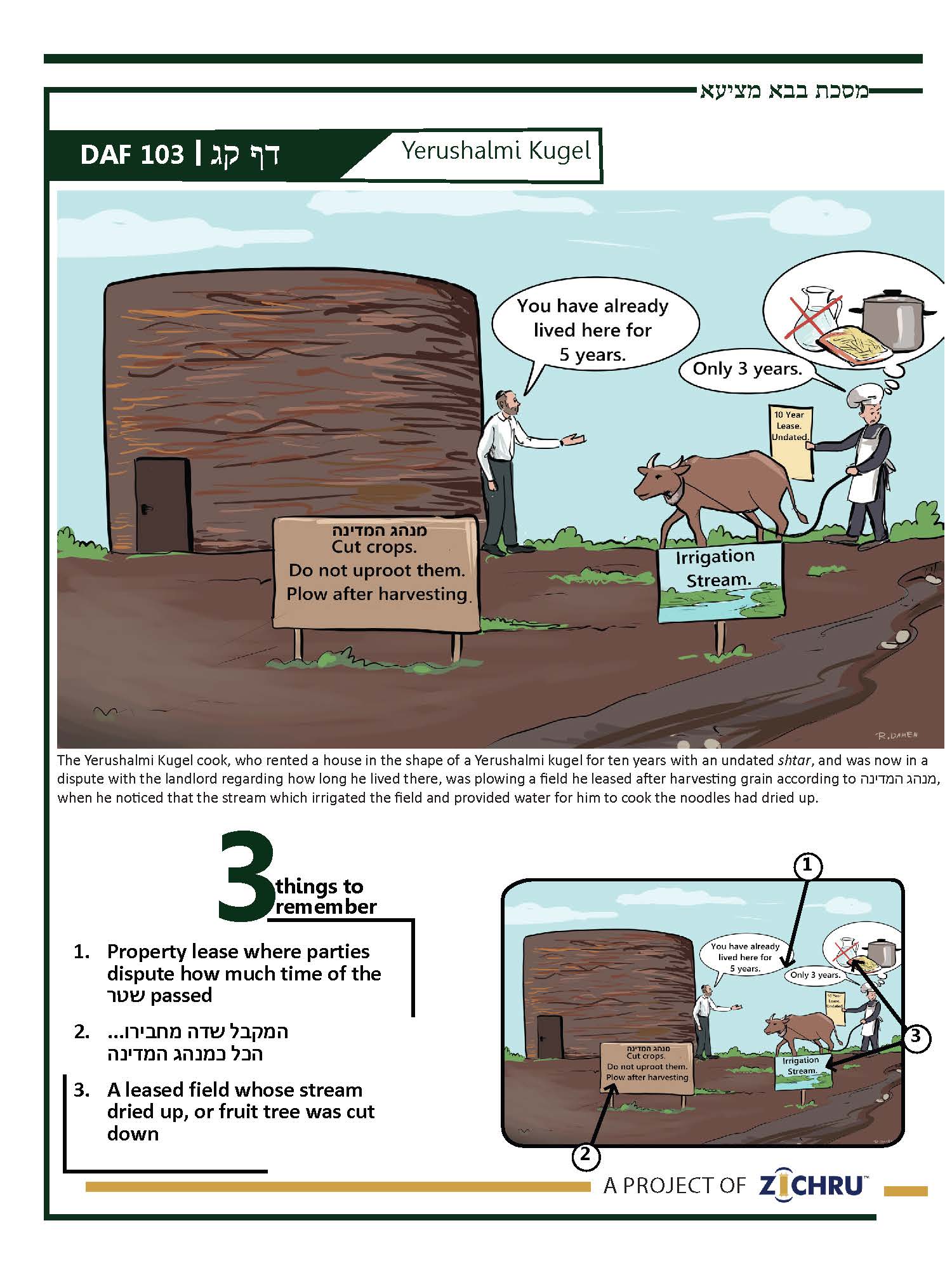Bava Metzia - Daf 103
- Audio Timestamps
0:00 - The 3 Sugyos
2:48 - Review of 3 Sugyos
5:19 - Siman
8:05 - 4 Blatt Back Chazarah
16:32 - Pop Quiz (Last 7 blatt)
- For access to all Zichru resources including PDFs, and illustrations CLICK HERE
- Property lease where the parties dispute how much time of the שטר passed
Rav Nachman said that if one rents out his house for ten years and wrote an undated שטר for the tenant certifying the term of the lease, and later claims that the tenant already lived there for five years (while the tenant claims he only lived there for three), the landlord is believed. Since his property is always in his possession, the tenant must prove his right to seven more years, despite his holding a שטר verifying his ten-year lease. Rav Acha of Difti asked Ravina, that if someone borrowed a thousand zuz with a שטר, and later claims he paid half the loan, is he believed?! He is not, which demonstrates that the lender’s possession of the שטר is sufficient proof to collect the entire amount!? Ravina responded that regarding a שטר of debt, שטר לגוביינא קאי – the document’s purpose is for collection. Therefore, if any amount had been paid, the borrower should have made sure to record this in the שטר itself or demand a receipt. In this case of a property lease, the owner can say: האי דכתיבי לך שטרא – this that I wrote a שטר for you, כי היכי דלא תחזק עליה – was only so you should not take possession of [my property] after living there for three years.
- המקבל שדה מחבירו...הכל כמנהג המדינה
The ninth Perek begins: המקבל שדה מחבירו – One who leases a field from his fellow (either as an אריס, where each takes a percentage of the crop, or as a חוכר, where the farmer pays a fixed amount of produce), מקום שנהגו לקצור יקצור – in a place where [farmers] customarily cut the crops, he cuts them; לעקור יעקור – if they customarily uproot them, he uproots them; לחרוש אחריו יחרוש – if they customarily plow the field after [harvesting], he plows it; הכל כמנהג המדינה – everything follows the local custom.
A Baraisa explains that שניהם מעכבין זה על זה - both [the owner and the farmer] can prevent one another from doing differently than the local custom to either cut the crops or uproot them. The owner may prefer cutting to uprooting, hoping that the stubble will fertilize his field, and the farmer may prefer cutting because it is less work. On the other hand, the owner may prefer uprooting, which will completely clear his land, and the farmer may prefer to uproot the crop, in order to feed the straw to his animals.
- A leased field whose stream dried up, or fruit tree was cut down
The next Mishnah states that if one leased a field, which was irrigated by a stream, or included a fruit tree (providing additional produce without effort), יבש המעין ונקצץ האילן – if the stream dried up, or the tree was cut down, אינו מנכה לו מן חכורו – he does not deduct from his rent because of the loss. However, if the tenant originally said: חכור לי שדה בית השלחין זו – “Lease me this irrigated field,” או שדה בית האילן זה – or “this field containing a tree,” indicating that the rate he was paying was because of these benefits, then he does deduct from his rental if the stream dries up, or the tree is cut down.
The Gemara asks that if the main river dried up, that is a מכת מדינה – general calamity, in which case the tenant may deduct from his rent, as taught on Daf 105b!? Rav Pappa explains: דיבש נהרא זוטא – the case is where the small stream dried up, and the landowner can tell the farmer that he can fetch water from elsewhere by pail.
Siman – Yerushalmi Kugel
The Yerushalmi Kugel cook, who rented a house in the shape of a Yerushalmi kugel for ten years with an undated shtar and was now in a dispute with the landlord regarding how long he lived there, was plowing a field he leased after harvesting the grain according to the מנהג המדינה, when he noticed that the stream which irrigated the field and provided water for him to cook the noodles had dried up.


